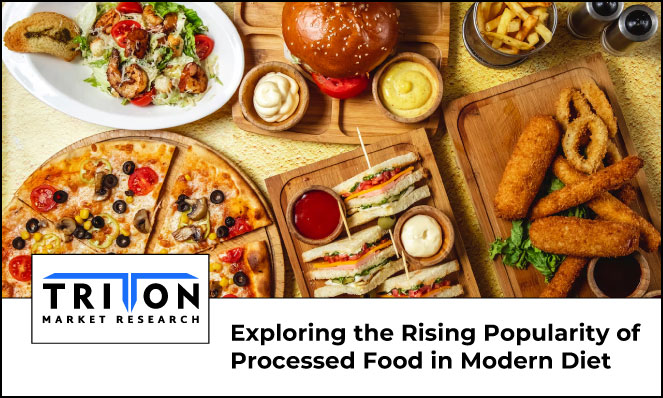



12, August 2024

Between 2000 and 2021, UNCTAD reported a remarkable increase of 350% in global food trade, with the total value reaching an astounding $1.7 trillion. Food accounts for about 8% of total global merchandise trade. Evidently, due to a rise in food production and trade, the trade of processed foods has also seen substantial growth. The evolution of processed foods mirrors the growth of the food and beverage industry itself, reflecting changing consumer lifestyles and advancements in food manufacturing.
Processed foods encompass a broad range of items that have been altered from their natural state. This includes simple processes like freezing and canning, as well as more complex processes like adding preservatives, flavorings, and other ingredients. In many developed countries, processed foods constitute a significant portion of daily dietary intake. For instance, in the United States, a staggering 57.5% of daily calories come from ultra-processed foods. This heavy reliance on processed foods is linked to poorer nutritional quality, as these foods typically have lower levels of essential nutrients like protein, fiber, vitamins, and minerals. Conversely, they are often high in carbohydrates, added sugars, and saturated fats.
As processed foods comprise a majority of our diets, their nutritional value is a primary concern. Let us examine how companies fortify and enrich processed foods to make them healthier.
As mentioned previously, these foods typically have lower levels of essential nutrients like protein, fiber, vitamins, and minerals. This is due to the processing techniques involved in processed foods. These processes cause the original food to lose nutritional value. Here are some specific ways processing affects nutrient content:
Heat: High temperatures used in cooking, canning, or pasteurizing can destroy heat-sensitive nutrients like vitamins C and B.
Light and Oxygen: Exposure to light and air can degrade vitamins A, C, and E.
Water: Water used in boiling or blanching can leach away water-soluble nutrients like vitamins B and C.
While these nutrient losses are often unavoidable, companies are employing methods to enhance the nutritional value of processed foods, such as fortification and enrichment. For example, adding vitamins and minerals to cereals or fortifying milk with vitamin D.
Kellogg’s: Fortifies its breakfast cereals with essential nutrients such as iron, B vitamins, and folic acid.
General Mills: Enriches products like Cheerios and other cereals with iron and B vitamins, contributing positively to daily nutritional intake, particularly for children.
While processed foods have become a staple in many diets due to their convenience and are considered as quick meal solutions, their health implications raise significant concerns. The primary health concern associated with processed foods is their contribution to obesity, type 2 diabetes, and high cholesterol.
Studies have shown that diets with higher consumption of ultra-processed foods are strongly correlated with increased caloric intake and weight gain. A study by Dr. Kevin D. Hall and his team at the National Institute of Diabetes and Digestive and Kidney Diseases (NIDDK) found that individuals consuming ultra-processed foods ingested approximately 500 more calories per day compared to when they consumed minimally processed foods. This led to an average weight gain of about 2 pounds during the ultra-processed diet phase.
Another study conducted by various institutions in the Netherlands and the UK found a connection between ultra-processed food (UPF) consumption and the incidence of type 2 diabetes in a Dutch cohort. It revealed that a 10% increase in UPF intake raises the risk of developing type 2 diabetes by 25%.
Processed foods are also often high in trans fats and saturated fats, which are known to elevate LDL (bad) cholesterol levels and lower HDL (good) cholesterol levels. This imbalance contributes to the development of cardiovascular diseases, including heart disease and stroke. High sodium content in processed foods further exacerbates this risk by contributing to hypertension.
Even though these findings are alarming, it is important to note that moderate consumption of processed foods can be part of a balanced diet. Making informed choices and prioritizing minimally processed foods occasionally and in moderation can help mitigate health risks.
Globally, packaged food, processed meats, processed beverages, and frozen foods have become the most popular processed foods consumed by people. In fact, Different types of processed foods are popular in different regions. For example, processed meats and frozen foods are highly popular in North America, while bakery products and packaged foods have high consumption in Europe.
In recent decades, due to the convenience offered by them, especially in developing regions like Africa and Asia, the availability of cheaper processed foods has played a crucial role in reducing overall hunger and improving food security. Higher incomes have enabled increased food consumption and decreased rates of undernutrition.
However, these benefits have come with some challenges, such as a rise in obesity rates, partly due to a significant share of increased food demand being met by processed foods. About 20% of Africans, or more than 250 million people, still go to bed hungry every day. Nonetheless, the reduction in hunger and undernutrition highlights the important role processed foods have played in improving lives across the region.
The upcoming prospects in food processing technology will focus on enhancing methods to address current challenges and drawbacks faced by the processed food industry. Influenced by contemporary movements such as the clean label movement, the goal is to ensure that processing methods and ingredients are more natural, simple, and transparent. A primary concern is mitigating the loss of nutritional content during processing and reducing high-fat content.
Cold Plasma is an emerging non-thermal food processing technology and method that uses ionized gas to eliminate bacteria and extend the shelf life of food without compromising the quality of the nutritional content in the food. It is particularly promising for fresh produce, preserving texture, flavor, and nutritional value better than traditional methods.
Food fortification: This method involves adding essential micronutrients to foods to address deficiencies. Various technologies support this process, such as premixing for even nutrient distribution, extrusion for cereals, and spray drying for powdered products. Companies like Vitaliz Biosciences specialize in nutritional ingredient formulations for various food products, and VitaKey develops a platform for precision nutrient delivery.
With these innovations, food fortification processes will continue to improve, addressing nutritional deficiencies more effectively.
The rapid growth of processed foods in global markets reflects both their convenience and the advances in food processing technology that make them appealing to consumers. However, this rise comes with significant health implications, necessitating a balanced approach to consumption. Consequently, the future trends in food processing are geared towards making these products healthier, more sustainable, and better tailored to individual needs.

Prevalent cases of terrorist attacks in today’s world is increasing the need for severe standards of security for public safety, and the global market for biometric technology scrupulously accommoda..
Prevalent cases of terrorist attacks in today’s world is increasing the need for..